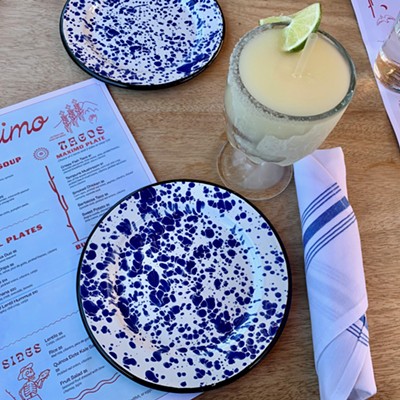Black tiger shrimp are monsters, the kind of creatures that make you think that maybe "jumbo shrimp" isn't such an oxymoron after all. The distinctive black-and-orange-striped shrimp can grow to more than a foot in length and over a pound in weight. And according to the Galveston Daily News, they're invading the Gulf of Mexico.
This doesn't sound like such a bad thing on the surface. After all, Black tiger shrimp are delicious. The Penaeus monodon is widely raised for food throughout Asia, to the extent that the giant shrimp has been placed on Greenpeace's infamous "red list" of species that are sourced from unsustainable fisheries.
While the Black tiger shrimp is hearty and fast-growing -- farmers can raise up to 40 tons of shrimp per acre a year -- the farms that typically house them in places like Indonesia, Thailand and Bangladesh are terrible for the surrounding environment.
Black tiger shrimp showing up in the Gulf of Mexico must mean that our waters could be a sustainable, wild fishery for these brutes -- right? Wrong.
The aggressive Black tigers are known for being an invasive species, feeding on smaller and weaker shrimp while also destroying the habitats of any other shrimp they didn't cannibalize. When all the shrimp are gone, the Black tigers then start to eat oysters.
The Gulf shrimp industry is a $700 million industry. The Gulf oyster industry, while significantly smaller at only $217 million annually, is equally important. The extended drought has already badly damaged oyster beds in the Gulf of Mexico, while the toxic effects of the recent red tide battered the industry even further.
Now, with the introduction of the destructive Black tiger shrimp into our waters, the combined shrimping and oyster industries -- which bring in nearly $1 billion per year -- are in danger once again.
Experts believe the current crop of Black tiger shrimp could have been brought to our waters by vessels passing through the Gulf of Mexico releasing their ballast. Ballast discharges have long been responsible for the introduction of invasive or destructive species across the world, as waters from one ocean or sea are released into a wholly different one.
In one notable case, zebra mussels were introduced into all five Great Lakes after an ocean-going vessel discharged its ballast in Lake St. Clair in 1988. The ongoing economic impact of the mussel invasion costs an estimated $5 billion per year.
A solution -- of sorts -- has been found for another destructive species: the oyster drill, a type of sea snail. Local seafood distributors Jim Gossen and P.J. Stoops have recommended eating the tiny drills that eat our Gulf oysters, although it's been difficult to persuade the general public that the snails are tasty.
That shouldn't be a problem with the Black tiger shrimp, which are already in demand worldwide, and could potentially turn into a cash crop for Gulf fishermen eager to rid their waters of pests and turn a profit. Fisherman Ron Pockrus told the Galveston Daily News that he was unsure if this was a possibility, but that "they have the potential to forever change (the shrimp fishing industry) in the Gulf."
Between the red tides and the drought, Gulf fishermen are likely to seek any port in this storm -- and that might mean wild, Gulf-caught Black tiger shrimp showing up on a menu near you some day.
Follow Eating Our Words on Facebook and on Twitter @EatingOurWords





